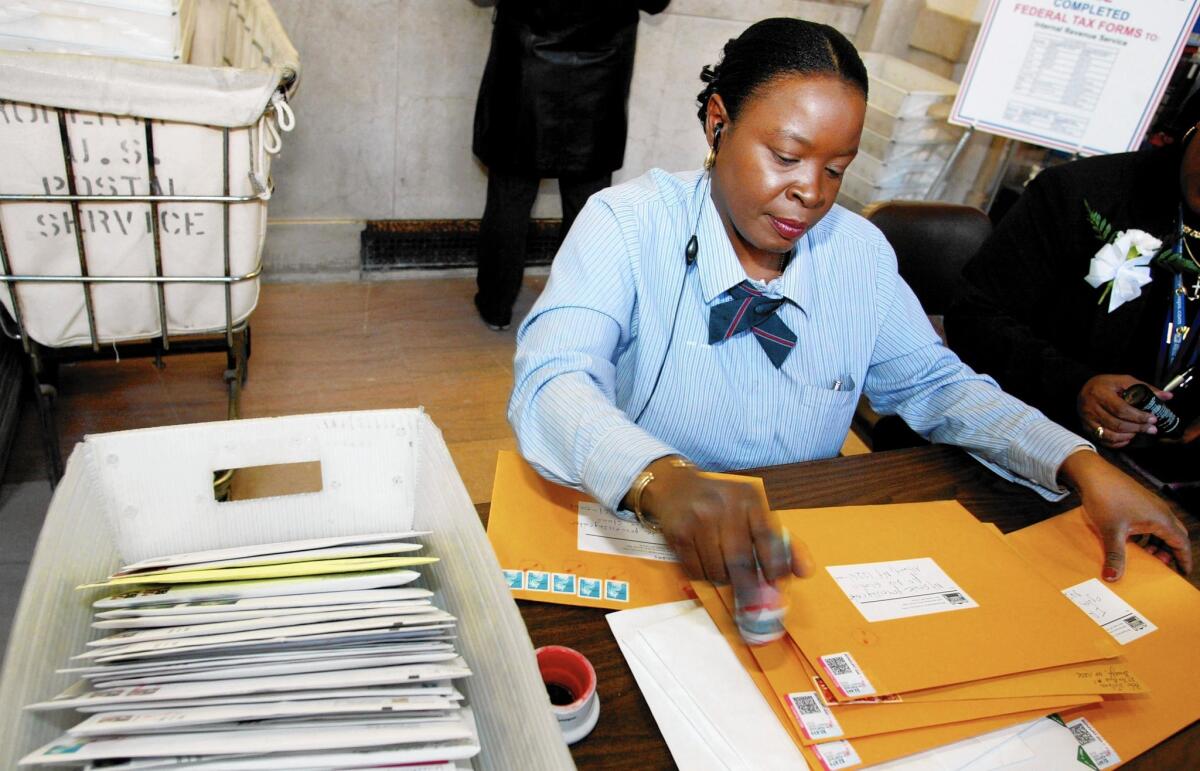Personal Finance Q&A: What to do when tax return gets lost in the mail

- Share via
Dear Liz: My CPA sent my completed tax return to my home address via first-class mail with no tracking number. The large envelope should have arrived in two days. Over a week has passed and it’s nowhere in sight. I am freaking out as it has all my financial data and is a gateway to fraud of every sort!
The various post office officials have really done nothing to assist in its location. I have credit freezes at all three bureaus and my bank accounts require passwords. What else can I do to try to avert disaster? I have been so distraught it has literally made me ill. And before you say it, yes, this mode of transit will never happen again.
Answer: It shouldn’t have happened in the first place.
With so much identity theft and tax refund fraud these days, it’s astonishing that tax preparers continue to send sensitive, personal information through the U.S. mail with no tracking — and in envelopes helpfully marked with the CPA firm’s name to make the returns easier for thieves to spot.
Your credit freezes should prevent identity thieves from opening new credit accounts in your name using purloined information, but they won’t stop tax refund fraud.
There’s typically not much you can do to protect yourself from this crime. People who have already been the victims of such fraud can request an “identity protection personal information number” or IP PIN from the Internal Revenue Service to prevent future fraudulent filings.
The IRS also allows residents of Florida, Georgia and the District of Columbia to request IP PINs as part of a pilot program, but residents of other states aren’t eligible.
You can try to file as early in the year as possible, but that’s no guarantee a criminal won’t file using your Social Security number first — and then it can take months to get any money you’re owed.
To help protect your bank accounts, see if your bank offers something called “two-factor authentication.” Two-factor authentication requires something you know, such as a password, plus something you have, such as a token that creates unique number codes or code that’s texted to your cellphone.
If your bank doesn’t offer this layer of protection, and only ascertains your identity with the use of security questions, strongly consider moving your accounts to another bank.
Security questions are easy to hack, as evidenced by the massive breach of the IRS’ Get Transcript service, where hackers were able to successfully answer the security questions for hundreds of thousands of taxpayer accounts.
Finding a missing 401(k) plan
Dear Liz: I have two 401(k) plans that have vanished into the night. They are both more than 20 years old and the companies I worked for have been bought, sold, merged, spun off, and nobody knows anything anymore. Between them, the accounts are worth six figures. Do you know of any way I can find out what happened to my money (and hopefully retrieve it)?
Answer: There’s no central repository for missing 401(k)s as there is for missing pensions, which typically can be found at the Pension Benefit Guaranty Corp. So tracking down your money can be tough.
If you still have paperwork from the missing accounts, you might check with the plan providers — the financial services companies that provided the investment choices.
If that’s a dead end, the U.S. Department of Labor’s Abandoned Plan Database shows plans that have been or are about to be terminated, typically with contact information for the plan administrator.
It’s possible that your money was turned over or escheated to a state unclaimed property department. You can check at Unclaimed.org, the official site of the National Assn. of Unclaimed Property Administrators. NAUPA also endorses the site MissingMoney.com.
Another place to check is the National Registry of Unclaimed Retirement Benefits, which is run by a private company called PenChecks that says it’s the largest private processor of retirement checks.
If you do find your money, understand that you may still have missed out on a lot of growth. Your investments may have been converted to cash, which has earned next to nothing in the last two decades, particularly after inflation.
Leaving a 401(k) account in an old employer’s plan can be a convenient option, but only if you’re willing to keep track of the money — and let the administrator know each time you change your address. If that’s too much work, you should roll the account into a new employer’s plan or into an IRA. Your retirement may depend on it.
Questions may be sent to Liz Weston, 3940 Laurel Canyon, No. 238, Studio City, CA 91604, or by using the “Contact” form at asklizweston.com. Distributed by No More Red Inc.
More to Read
Inside the business of entertainment
The Wide Shot brings you news, analysis and insights on everything from streaming wars to production — and what it all means for the future.
You may occasionally receive promotional content from the Los Angeles Times.










